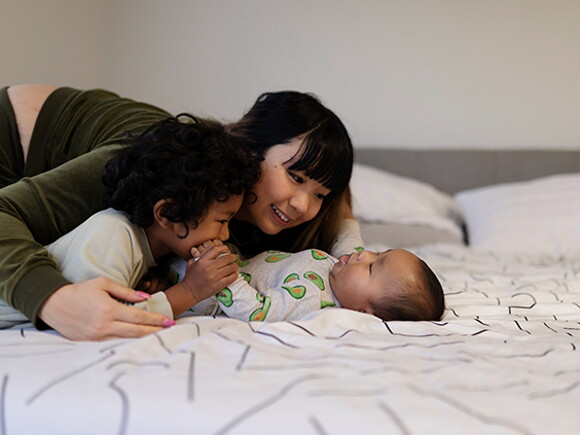Understanding the journey of your baby’s development from infancy through toddlerhood lets you cherish every milestone and support them through each stage. This comprehensive guide offers insights into the milestones of baby development, touching on crucial stages from birth to two years old.
Baby development between 0 to 6 months
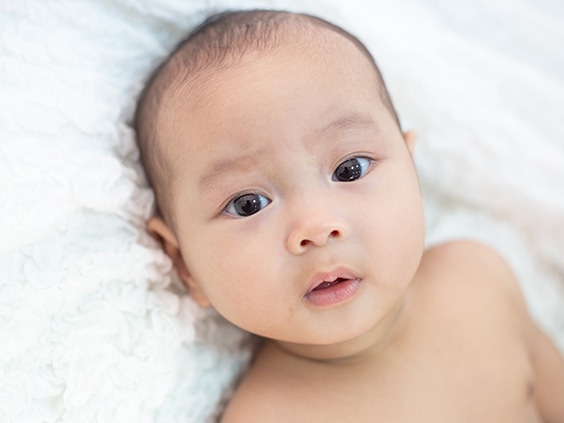
The first six months are a whirlwind of development for your baby. Initially, their world revolves around mastering basic instinctual reflexes crucial for survival, such as sucking, swallowing, and grasping. As the weeks progress, you'll notice your baby's awareness and curiosity about the world expanding dramatically.
Key milestones include:
- Social smiles: Your baby will begin to reward your care and interaction with adorable social smiles around 2 months old. This milestone represents a significant step in social development, as babies start to communicate happiness and satisfaction outside of their basic needs. Social smiles are a baby’s first steps in engaging in social interaction and are crucial for bonding with caregivers and fostering an early sense of trust and security.
- Cooing and gurgling: This stage is crucial as it marks the beginning of intentional communication. Through these sounds, babies explore their vocal cords, learn cause and effect as they realize their sounds can elicit responses, and begin to understand the fundamentals of language. Encouragement and engagement from caregivers in response to these early vocalizations support cognitive development and strengthen the bond between the baby and those around them.
- Rolling over: Around 4 to 6 months marks a pivotal moment in physical development, signifying the baby's first major movement milestone. Rolling over from back to front or front to back showcases developing muscle strength, coordination, and the first signs of independence in movement. This achievement is a physical milestone and provides the foundation for future gross motor skills such as sitting up, crawling, and eventually walking. It gives babies new perspectives on their environment, which encourages cognitive development and curiosity. Sensory integration is improved as they engage with the world from different angles.
Baby development between 6 to 12 months
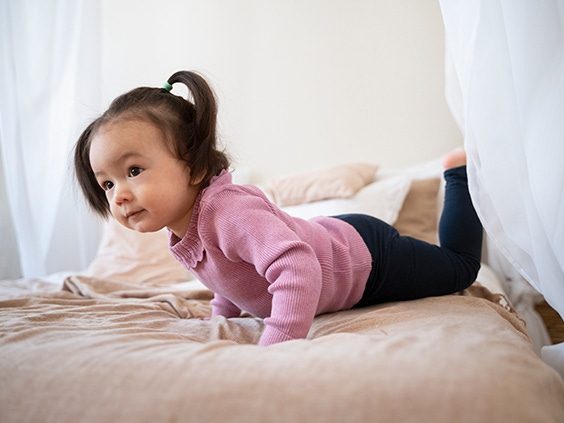
This phase is marked by major developments in mobility and sensory exploration. Your baby will start to understand the relationship between cause and effect and show interest in more complex interactions with both people and objects.
Key milestones include:
- Sitting up: By 6 to 7 months, most babies can sit without support, giving them a new perspective on their environment.
- Crawling: Between 7 and 10 months, babies often begin to crawl and attain the freedom to explore their surroundings.
- First words: While the timing varies, around their first birthday, many babies start practicing first words beyond "mama" and "dada", signaling the onset of active verbal communication.
Development of the child from one year onwards
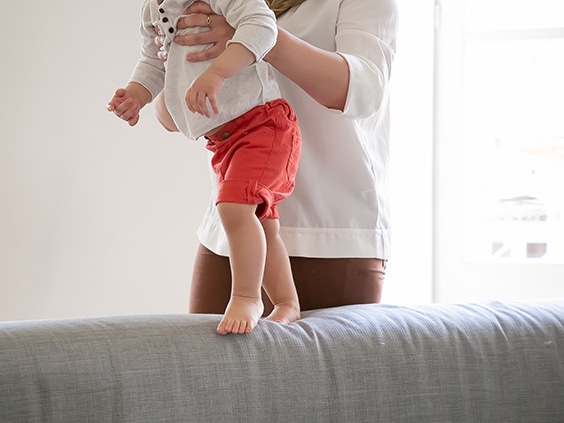
Entering the toddler years, your child's development accelerates in the realms of mobility, language, and personal and social awareness. They become keen explorers, with a growing desire to understand the world around them and make sense of their place within it.
Key achievements include:
- Walking: The onset of walking is a significant leap toward independence. This milestone typically occurs around the child's first birthday and is the first of many steps towards exploring their environment autonomously. Walking displays an increase in physical capability and opens up avenues for cognitive and social development. As toddlers begin to navigate their surroundings on two feet, they develop a stronger sense of spatial awareness, balance, and coordination. This newfound mobility allows them to interact more effectively with their environment, including peers and adults, facilitating richer social interactions and learning opportunities.
- Increased vocabulary: With the increase in mobility comes a dramatic expansion of vocabulary. At 12 months, toddlers experience a language explosion, rapidly expanding their vocabulary to potentially hundreds of words by their second birthday. This growth is not just quantitative; the quality of communication improves as toddlers start to combine words into simple sentences, express a range of needs and emotions, and engage in more complex interactions. Language development is crucial, serving as the foundation for future reading and writing skills, cognitive development, and social interactions. The environment plays a significant role in this progress, with everyday conversations, stories, and songs enriching the toddler's language learning.
- Self-feeding: Simultaneously, toddlers exhibit an increased interest in self-feeding, displaying their improved motor skills. This milestone is a crucial component of their burgeoning independence and autonomy. As they grasp spoons, pick up finger foods, and express preferences for certain flavors and textures, toddlers learn about decision-making, cause and effect, and the sensory attributes of different foods. This exploration of food not only facilitates physical growth and health but also contributes to their emotional and cognitive development. Self-feeding encourages patience, concentration, and the development of fine motor skills, which are vital for later tasks such as writing.
Development of the child from 2 years old
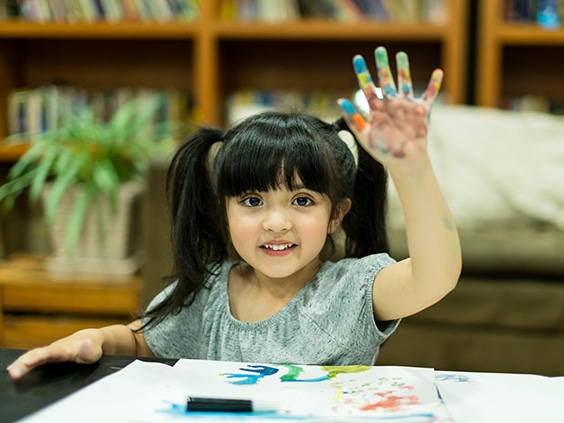
The year between two and three is filled with leaps in language and social skills. Your child will begin to string words into sentences, express a wide range of emotions, and show a clearer understanding of concepts like time, space, and quantity.
Notable developments include:
- Enhanced motor skills: Your child's ability to run, jump, and climb evolves. They are engaged in constant movement and exploration.
- Potty training: Many children show readiness for potty training during this period, marking an important milestone in autonomy.
- Imaginative play: Two-year-olds begin engaging in imaginative play, using objects symbolically and diving into the world of pretend.
The development of a baby is a magical, albeit complex, journey. Each child's path is unique. While developmental milestones provide a useful guide, it's essential to remember that variations are normal. Celebrate each achievement, provide a supportive and stimulating environment, and enjoy the exciting journey of growth with your child.










